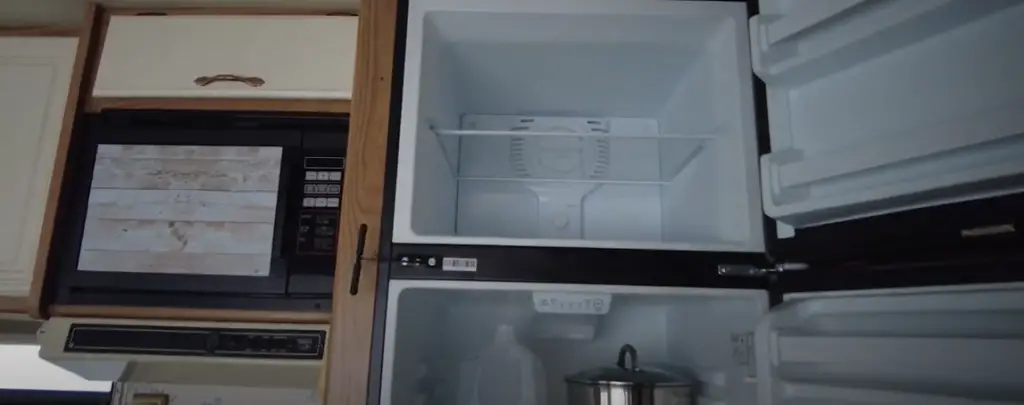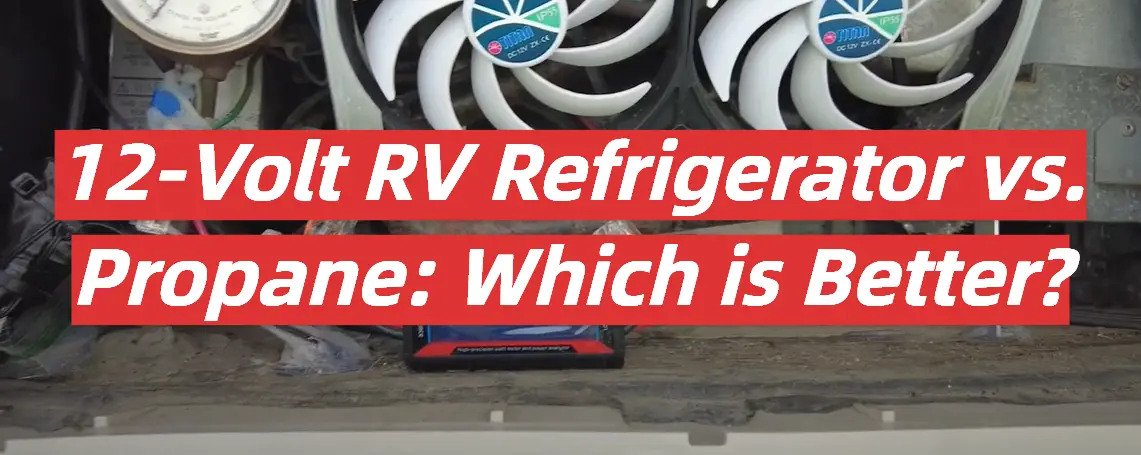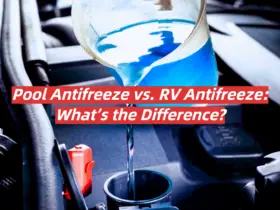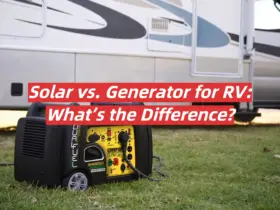Embarking on an adventure-filled road trip with your recreational vehicle (RV) demands absolute preparedness, and one crucial decision that can make or break your journey is choosing the right refrigerator. Picture this: the breathtaking landscapes whizzing past your window, the wind tousling your hair, and the promise of picturesque campsites lingering in the air. Now, to keep your road trip companions’ stomachs happy and your culinary dreams alive, you’re faced with an intriguing conundrum: 12-volt RV refrigerators or their propane-powered counterparts? This guide will delve into the depths of this clash of the cooling titans, and determine which option leaves your RV’s kitchen feeling more chilled.
Table of Contents
What Is A 12-Volt RV Refrigerator and how does it work?
A 12-volt RV refrigerator is a type of cooling system designed to keep perishable goods fresh while you are on the road. This type of refrigerator operates similarly to a normal household fridge but with slight differences. The main difference between the two is that an RV refrigerator runs on DC power rather than AC power and has fewer energy-intensive components like condensers and compressors. Instead, the RV refrigerator relies on a 12-volt battery to power its thermal electric cooling system.
When shopping for an RV refrigerator, it is important to consider the size of the unit, its capacity, and its power requirements. You should also take into account any additional features like ice makers or self-defrosting cycles that might be beneficial on your travels. Ultimately, the best choice will depend upon your individual needs. With the right research and information, you can make an informed decision that will ensure a long-lasting experience with your RV refrigerator [1].

Benefits of a 12 Volt RV Fridge
Portable and Energy Efficient
One of the most obvious benefits of having an RV refrigerator is the convenience it offers while traveling. With an RV refrigerator, you can bring it along on your adventures, ensuring that you always have access to cold food and drinks no matter where you go. Whether you’re camping in the wilderness or exploring new destinations, you can enjoy the luxury of having a reliable source of refrigeration.
Not only does an RV refrigerator provide mobility, but it is also remarkably energy-efficient. Unlike traditional fridges, 12-volt RV refrigerators don’t have condensers and compressors, which makes them consume less power. This energy efficiency not only helps you save money on your electric bill but also makes a positive impact on the environment.
By opting for an RV refrigerator, you’re making a practical choice that enhances your travel experience. So, next time you hit the road, enjoy the freedom of having a portable and eco-friendly refrigeration solution right by your side!
Space-Saving Design
One of the key advantages of an RV refrigerator is its compact size, which makes it an excellent choice for tight spaces such as trailers or campers. Most 12-volt RV refrigerators are specifically designed to be smaller than traditional models, allowing you to maximize space and optimize your living area even further. Not only do these compact refrigerators fit seamlessly into your RV’s layout, but they also come with adjustable shelves and door bins that provide a customizable storage solution for your food items, enabling you to make the most efficient use of the available interior space. With these features, RV refrigerators offer both functionality and convenience for your on-the-go lifestyle.
Reliable Cooling
When you’re on the road, you never have to worry about your food going bad as long as you’ve got a reliable RV refrigerator. Most 12-volt refrigerators come equipped with advanced cooling systems and thermostat controls that allow for precise temperature adjustments, ensuring that your perishables stay fresh until you’re ready to enjoy them. Furthermore, these devices come with energy-saving features such as automatic shutoff and low power mode that can help you conserve energy and save money in the long run.

No Flame or Propane
Unlike traditional fridges, RV refrigerators operate without the need for any flame or propane. This outstanding feature not only ensures convenience but also enhances safety, making them suitable for various environments where open flames are strictly prohibited or considered unsafe. So, whether you’re exploring the great outdoors or embarking on a road trip, you can rely on an RV refrigerator to provide a reliable source of cooling while prioritizing your safety and peace of mind.
Auto Defrosting
Another advantage of having an RV refrigerator is its auto-defrost feature. This allows the fridge to keep itself free from frost build-up, eliminating the need for manual defrosting and the hassle of water clean-up. With this handy feature, you can enjoy easy maintenance and effortless operation on long trips as well as everyday use at home.
Can Be Powered by Solar
Some 12-volt RV refrigerators come with solar power capabilities, allowing you to use the sun’s energy to power your device. By investing in a solar-powered RV refrigerator, you can enjoy an off-the-grid experience without having to worry about running out of battery power. These units are usually equipped with built-in solar panels and inverters that can charge your fridge even when the sun isn’t shining, giving you a dependable source of power no matter where you go [2].
Some facts about Propane RV Refrigerator
When considering RV refrigerators, propane fridges are a popular choice. Here are some facts about propane fridges that you should know before making a purchase:
- Propane refrigerators require ventilation to the outside and must be installed in well-ventilated areas.
- Propane runs on an open flame which has the potential to increase safety risks in the RV.
- Propane refrigerators are more efficient than electric models and can save you money on energy costs.
- Propane fridges require regular maintenance, including checking for leaks and cleaning the burner area to keep it running smoothly.
- When considering a propane refrigerator, make sure that your RV is wired correctly and equipped with a thermostat for optimal performance.
- Propane fridges are known to be more reliable than electric models and can last up to 10 years with proper maintenance.
- There are different sizes of propane RV refrigerators available, from 7 cubic feet to 16 cubic feet, so you’ll need to choose the one that fits your needs best.
- They come in many styles, colors and finishes so you can find the right one for your RV interior.
- Propane fridges are typically more expensive than electric models, but they may be worth it in the long run due to their efficiency and longevity.
- Lastly, make sure that you have plenty of propane on hand if you’re planning a long road trip with your RV refrigerator.
With a bit of research and maintenance, you can have an efficient propane RV refrigerator that will last for years to come [3]!

What is better: a 12-Volt RV Refrigerator or Propane RV Refrigerator?
When it comes to choosing the best refrigerator for your RV, you have two main choices: a 12-Volt RV Refrigerator or a Propane RV Refrigerator. Both options offer their own unique advantages and drawbacks, making it important to carefully consider each option before deciding which one is right for you.
Propane refrigerators require an additional fuel source to run, but they can offer more storage space and cooling power. They are often the preferred choice for larger families or those who need extra refrigerator space. Propane refrigerators can also be used even when you don’t have access to electricity, making them a great option for camping trips.
Overall, which type of RV refrigerator is best for you depends on your needs and budget. 12-volt refrigerators are great for those with limited budgets, while propane refrigerators offer more power and storage space. Consider your needs carefully before deciding so you can choose the best refrigerator for your RV.
When it comes to features, both types of refrigerators offer a variety of options. 12-Volt RV Refrigerators often come with digital temperature displays, adjustable shelves, and built-in power outlets. Propane RV Refrigerators often feature adjustable thermostats, automatic shutoff valves for safety, and upgraded insulation for better energy efficiency [4].
FAQ
Is it better to run an RV fridge on propane?
The decision to use propane or electricity to power your RV refrigerator will depend on a few factors, such as the size of your RV and the cost of electricity and propane. Generally, an RV fridge will run more efficiently on propane because it is a more consistent source of energy than electricity. Additionally, if you plan on being off the grid for long periods, propane can be a more reliable and convenient choice. Ultimately, it’s up to you to decide which option works best for your situation.
Are RV refrigerators hard to maintain?
No – while RV refrigerators may require occasional maintenance depending on the type, most models are designed with convenience in mind. This means that you can often find it easy to keep your RV fridge in good condition. For example, you might need to periodically wipe down the interior and exterior of the refrigerator, as well as check for any faulty seals or parts. In general, however, RV refrigerators are designed to be low-maintenance and reliable.

Is it cheaper to run an RV fridge on propane or electric?
In most cases, running an RV refrigerator on propane will be cheaper than electric. Propane is a more consistent source of energy and is generally less expensive to purchase in bulk. Additionally, propane can be stored for long periods without going bad – so it’s cost-effective for long trips or over the winter months. On the other hand, electricity is usually more expensive and can fluctuate in price depending on your location. Ultimately, it’s up to you to decide which option works best for your budget.
Does an RV fridge cool faster on propane or electric?
Most RV refrigerators are designed to cool more quickly and consistently when running on propane. This is because propane offers a more consistent source of energy than electricity, which can cause fluctuations in power. Additionally, if you plan on being off the grid for long periods, propane can be a more reliable choice than electric – as your refrigerator won’t need to constantly adjust to changes in power. Overall, an RV fridge should cool faster when running on propane.
Are there any safety concerns with RV refrigerators?
Yes – like all appliances, it’s important to take the necessary precautions when using an RV refrigerator. Make sure your refrigerator is properly installed and sealed before use, as well as check for faulty parts or seals. Additionally, make sure to follow all safety regulations when using propane – such as keeping the tank out of direct sunlight and away from any open flames. By following these simple steps, you can ensure that your RV refrigerator is safe and reliable.
How often should I clean my RV fridge?
It’s usually best to clean your RV refrigerator every couple of months, depending on usage. This will help to keep the interior and exterior of the refrigerator clean and free from dirt, dust, and other debris. Additionally, make sure to check for any faulty seals or parts while cleaning – as these can affect the performance of your fridge. By regularly cleaning your RV fridge, you can ensure that it runs smoothly and efficiently.
Are RV refrigerators energy-efficient?
Yes, RV refrigerators are typically designed to be highly energy efficient, utilizing less power compared to traditional residential units. This is advantageous for RV owners who are often reliant on limited power sources. Moreover, the option to use propane as an energy source can further contribute to reducing overall energy consumption. Propane offers a consistent and reliable energy supply, making it an attractive choice for RV refrigeration. Ultimately, investing in an RV refrigerator not only helps to lower energy usage but also provides long-term cost savings, making it a wise and sustainable choice for RV enthusiasts.
Can I install an RV refrigerator myself?
In most cases, yes – as long as you’re comfortable with basic DIY repairs and installations. Before getting started, it’s important to make sure you have all the necessary parts and tools for the job. Additionally, make sure to follow all safety regulations when installing your RV refrigerator – such as turning off the power before beginning and wearing protective gear. By taking the necessary precautions, you can successfully install your own RV refrigerator.
What are the advantages and disadvantages of a propane refrigerator?
The main advantage of a propane refrigerator is that it can generally be run more efficiently than an electric one. Propane offers a consistent source of energy and can be stored for long periods without going bad – making it ideal for off-grid trips or over the winter months. On the other hand, one disadvantage of a propane refrigerator is that you may have to periodically purchase propane for refueling. Additionally, some models may require more maintenance than a standard electric refrigerator. Ultimately, it’s up to you to decide which option works best for your situation.
What is the best way to store food in an RV fridge?
The best way to store food in an RV refrigerator is by keeping it organized and labeled with expiration dates. Additionally, it’s important to keep the refrigerator closed as much as possible in order to maintain an even temperature and prevent food from spoiling. You should also make sure to properly clean your RV fridge every couple of months – as this will help to keep it running smoothly and efficiently. By following these simple steps, you can ensure that your food is stored safely and properly in your RV refrigerator.
Useful Video: RV Refrigerator Comparison / POWER CONSUMPTION 12volt Compressor vs Absorption (using propane)
Conclusion Paragraph
RV refrigerators are a great choice for those looking to save money and energy while on the road. By keeping up with regular maintenance, you can ensure that your RV refrigerator runs efficiently and effectively. Additionally, investing in a propane refrigerator can provide extra savings over electric models – as well as a consistent and reliable energy source. Ultimately, RV refrigerators are a great way to maintain an efficient lifestyle while on the go.
References:
- https://www.mortonsonthemove.com/12-volt-rv-refrigerator/
- https://www.asobolife.com/why-12v-fridges-are-essential-for-van-life/
- https://lifeonroute.com/rv-fridge-works/
- https://www.rvcampgear.com/12-volt-rv-refrigerator-vs-propane/






Leave a Reply